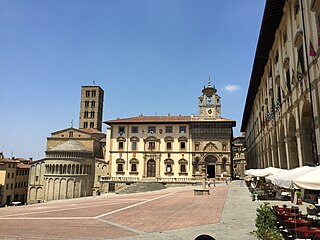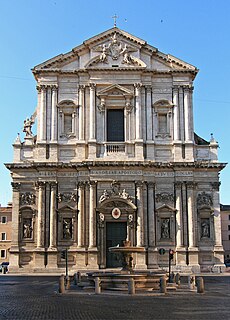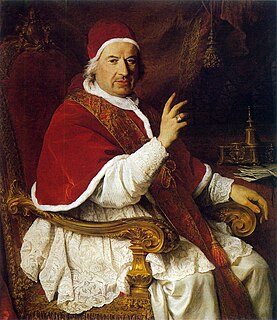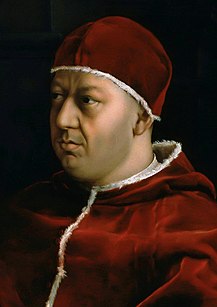
Pope Benedict IV was Pope from 1 February 900 to his death in 903. The tenth-century historian Flodoard, who nicknamed him "the Great", commended his noble birth and public generosity. He succeeded Pope John IX (898–900) and was followed by Pope Leo V (903).

The Barnabites are Catholic priests and Religious Brothers belonging to the Roman Catholic religious order of the Clerics Regular of St. Paul, founded in 1530. While they used to use the postnominal initials of simply "B.", they currently use C.R.S.P. Associated to the members of the Order are the Angelic Sisters of St. Paul and the lay members of the Barnabite lay movement.

Gaetano dei Conti di Thiene, known as Saint Cajetan, was an Italian Catholic priest and religious reformer, co-founder of the Theatines. He is recognised as a saint in the Catholic Church, and his feast day is August 7.

Ercole Consalvi was a deacon and cardinal of the Catholic Church, who served twice as Cardinal Secretary of State for the Papal States and who played a crucial role in the post-Napoleonic reassertion of the legitimist principle of the divine right of kings, of which he was a constant supporter.
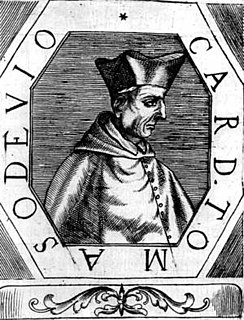
Thomas Cajetan, also known as Gaetanus, commonly Tommaso de Vio or Thomas de Vio, was an Italian philosopher, theologian, cardinal and the Master of the Order of Preachers 1508-18. He was a leading theologian of his day who is now best known as the spokesman for Catholic opposition to the teachings of Martin Luther and the Protestant Reformation while he was the Pope's Legate in Augsburg, and perhaps also among Catholics for his extensive commentary on the Summa Theologica of Thomas Aquinas.

Tommaso Maria Zigliara, OP was a Roman Catholic priest of the Dominican Order, a theologian, philosopher and a cardinal.

The Theatines or the Congregation of Clerics Regular of the Divine Providence are a religious order of the Catholic Church, with the post-nominal initials "C.R."
Carlo Passaglia was an Italian Jesuit.
Giovanni Perrone was an Italian theologian.
Giuseppe Agostino Orsi was a cardinal, theologian, and ecclesiastical historian.
Gioacchino Ventura di Raulica, was an Italian Roman Catholic pulpit orator, patriot, philosopher and writer.
Saint Giustino de Jacobis was an Italian Roman Catholic bishop and professed member of the Congregation of the Mission who became a Vicar Apostolic in Ethiopia and the Titular Bishop of Nilopolis. He is also known as Justin de Jacobis.

Saint Andrew (Andrea) Avellino was an Italian priest. He is venerated as patron saint of Naples and Sicily and invoked especially against a sudden death.
Felice Cavagnis was an Italian canon lawyer and Cardinal.
Johann Baptist Franzelin was an Austrian Jesuit theologian and Cardinal.
Juan Bautista de Lezana was a Spanish Carmelite theologian. Lezana was an authority on canon law, dogmatic theology, and philosophy; his historical works are not of the same standard.
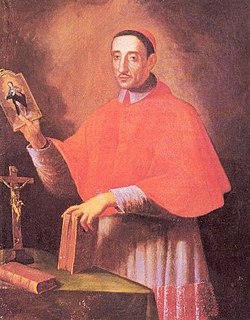
Saint Joseph Mary Tomasi, C.R. (12 September 1649 – 1 January 1713), was an Italian Theatine Catholic priest, scholar, reformer and cardinal. His scholarship was a significant source of the reforms in the liturgy of the Roman Catholic Church during the 20th century. He was beatified by Pope Pius VII in 1803, and was canonized by Pope John Paul II in 1986.

Luigi Lambruschini was an Italian cardinal of the Roman Catholic Church in the mid nineteenth century. He was a member of the Clerics Regular of St. Paul and served in the diplomatic corps of the Holy See.
Dom Thomas de Castro (c.1621-1684) was a native of Divar in Goa, Portuguese India. The Holy See appointed him Vicar Apostolic of Canara on 30 August 1675. He later founded the famous Milagres Church in Mangalore, South Canara, Karnataka. He was the nephew of Dom Matheus de Castro (c.1594−1677), the first Indian Bishop of The Catholic Church.
Gianbernardino Scotti was an Italian Roman Catholic bishop and cardinal.
